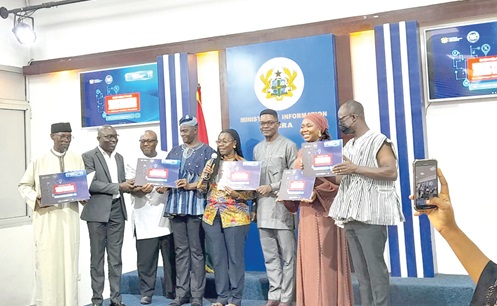
Address misinformation, disinformation in digital space - Stakeholders urged
Speakers at the launch of this year’s National Cyber Security Awareness Month have stressed the need for stakeholders to address misinformation and disinformation in the digital space as the country heads towards the elections in December.
This, they explained, was because the spread of misinformation and disinformation in the country had the tendency to destabilise the peace, democratic processes and governance of the country by eroding trust in institutions.
The speakers were the Minister of Communications and Digitalisation, Ursula Owusu-Ekuful; the Director-General of the Cyber Security Authority, Dr Albert Antwi-Boasiako; the Executive Director of the Institute for Democratic Governance (IDEG), Dr Emmanuel Akwetey; the Director of the National Counter-Terrorism Fusion Centre, Brigadier General Dr Tim Ba-Taa-Banah, and the General Secretary of the Ghana Journalists Association (GJA), Edmund Kofi Yeboah.
Awareness Month
Since 2018, the month of October has been instituted as the national cyber security awareness month to promote awareness of digital safety and best practices.
This year’s celebration is on the theme: “Combating misinformation and disinformation in a digitally resilient democracy: our collective responsibility”.
Mrs Owusu-Ekuful stressed the need for all actors to work together to ensure that while celebrating the positive impact that digital interventions could have on the socio-economic fabric of the country, they work to mitigate its negative impact.
She called on everyone not to believe anything that they saw or heard on social media since it could be fake.
“As we post information voluntarily on social media, actors through technology can mimic you and put words that you never uttered in your mouth and make people believe it because of technology. Even more worrying is the impact that it is having on our younger people, who spend so much time online,” she said.
Mr Yeboah pointed out that the media, particularly social media, had been the major conduit for the spread of misinformation and disinformation, and therefore, called on the media to make it a cardinal duty to curb misinformation and disinformation at all times.
“Especially in the 2024 elections, the media must endeavour to verify information before publishing it. In as much as speed is good in journalism, we must never lose consciousness of the fact that accuracy overrides speed and that it is destructive rather than productive to rush and crash. We urge the media not to give their platform to political actors and others to spread misinformation and disinformation,” he stressed.
Brigadier General Dr Ba-Taa-Banah pointed out that the security landscape of the West African sub-region was not getting any better, and that Ghana was not immune from the threats that surrounded it.
He said those making the sub-region unsafe were doing so through the use of cyber resources, and that was why the deep demand for cyber awareness among the citizens was the least the country could do.
Statistics
Quoting a global research platform, Statista, Dr Antwi-Boasiako said as of January 2024, an estimated 24.06 million Ghanaians were connected to the internet, with 7.60 million being active users on social media.
“It is important to intensify the education of stakeholders, including the public and the media and communications fraternity, on how to detect and report misinformation to stop it from spreading,” he said.
There were also messages from civil society organisations represented by Dr Akwetey of IDEG; Dr Kojo Pumpuni Asante from CDD Ghana and Sheikh Armiyawo Shaibu of CODEO, who touched on the role of disinformation and misinformation in destabilising the gains made in the electoral process.
